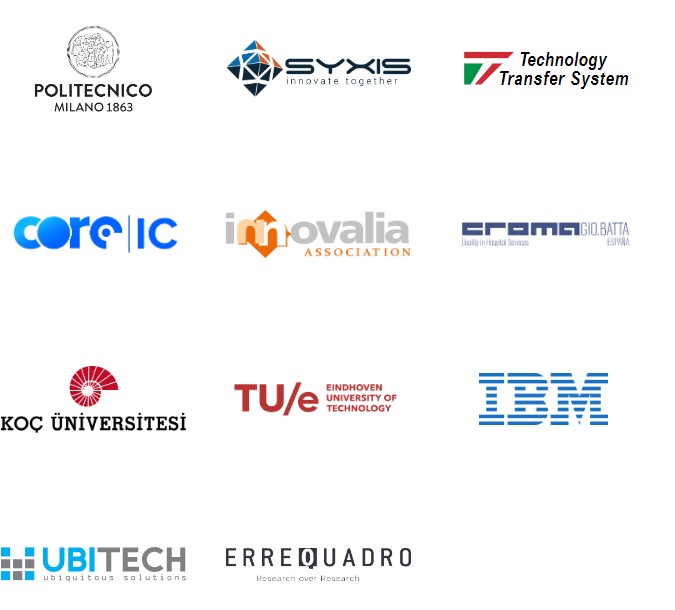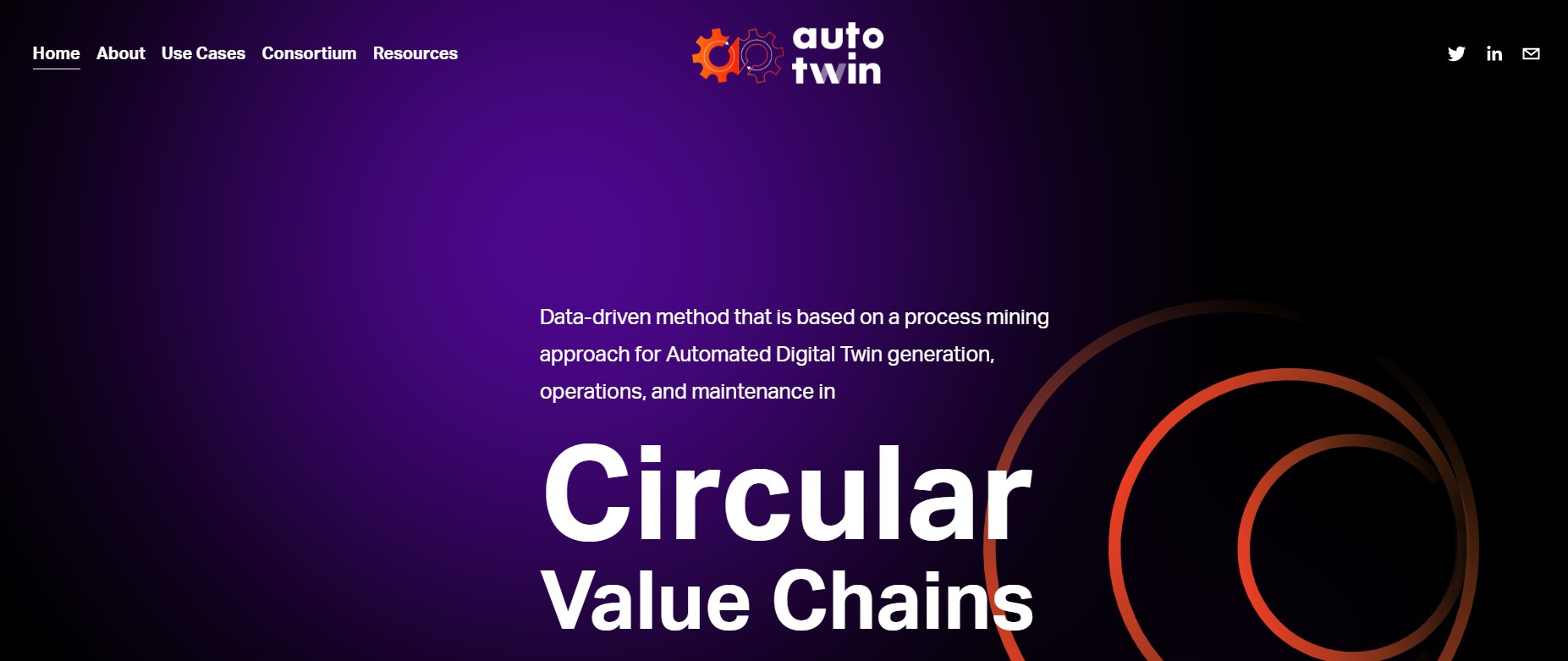February 20, 2023
Dear reader,
we would like to present to you the AUTO-TWIN PROJECT: Data-driven method based on a process mining approach for Automated Digital Twin generation, operations, and maintenance in circular value chains.
Horizon Europe Framework Program
The AUTO-TWIN project introduces a breakthrough method for automated process-aware discovery towards autonomous Digital Twins generation, making it more efficient and cost-effective. It addresses the technological shortcoming and economic liability of the development and usage of digital twins that are accepted as the accelerator and enabler of Circular Economy in businesses and production, conducting research in 3 areas: 1) introducing a breakthrough method for automated process-aware discovery towards autonomous Digital Twins generation, to support trustworthy business processes in circular economies; 2) adopting an (International Data Space) IDS- based common data space, to promote and facilitate the secure and seamless exchange of manufacturing/product/business data within value-networks in a circular-economy ecosystem; 3) integrating novel hardware technologies into the digital thread, to create smart Green Gateways, empowering companies to perform data and digital twin enabled green decisions, and to unleash their full potential for actual zero-waste Circular Economy and reduced dependency from raw materials.
Auto-Twin Consortium
The consortium is composed by 13 partners from 7 different countries, together in the project for the time of 36 months.
AUTO-TWIN is coordinated by Politecnico di Milano, led by PhD Andrea Matta. POLIMI coordinates the project’s efforts and ensure the timely and cost-effective project execution. PMI will exploit its experience in process mining research applied to manufacturing systems for developing algorithms for learning, adapting, and tuning the component models of a digital twin.
Auto-Twin Partners
POLITECNICO DI MILANO
Politecnico di Milano is the most important technical university in Italy and one of best in Europe according to recent rankings. Since 1836, Politecnico di Milano has been active in several scientific and technical fields and will join through the Department of Mechanical Engineering. The Department of Mechanical Engineering is ranked 1st in Italy, 5th in Europe and 17th worldwide (Engineering – Mechanical, Aeronautical & Manufacturing – QS 2018) and it is among the 180 “Excellent Departments” selected in 2018 by the Italian Ministry of Education, University and Research. It has 128 full-time faculty members, 68 research fellows, 194 Ph.D. candidates and 52 technical and administrative staff. The mission of the Department of Mechanical Engineering is to promote and develop culture, research and innovation in its sectors of reference, but also in new fields doomed to become more and more important in society and in our present background. For example, it specifically deals with transports and sustainable mobility, power technologies, biomechanics and service robotics, bio materials, smart materials and hybrid materials, manufacturing and production systems, space and security.
SYXIS
SYXIS is a federation that involves innovative enterprises for testing sustainable pathways. Syxis is involved in the development of the project’s software architecture, also ensuring the creation of a common data space that will guarantee AUTO-TWIN applicability. Moreover, it develops a UX that could guarantee the user-friendly utilization of data, and it is involved in the deployment and operation of a code maintenance repository to ensure the usability of the software components. With respect to the project’s dissemination phases, Syxis takes care of identifying the contributions that the project will make to Europe’s AI community, associations, and clusters leading.
TTS
Technology Transfer System is a company dedicated to the development of proprietary and customised IT solutions and technology transfer actions in the manufacturing sector. TTS supports AUTO-TWIN project by ensuring a successful requirements analysis and providing guidelines for the industrial uptake of AUTO-TWIN solutions. TTS leads the examination of the industrial needs and requirements, and the functional architecture specification, and develops the necessary functional modules for automatically executing and validating simulations.
CORE
CORE focuses on exploiting data to provide tailor made machine-learning algorithms for predictive maintenance and smart energy management in industrial applications, such as manufacturing, energy, critical infrastructure, and smart systems. Core will lead the project towards other existing projects through dissemination and communication activities, and exploitation and IPR strategies, participating also to the AI-empowering of Green Gateways and the early solution customisation phase.


INNOVALIA
INNOVALIA is a group of technology-focused firms dedicated to digital technologies and advanced manufacturing, aimed at the digitalisation of industry. Innovalia guarantees the interoperability of the different components of AUTO-TWIN and the compatibility with external tools such as MES, and leads pilot setups and final customisation.
KOÇ UNIVERSITY
KOÇ UNIVERSITY research group, led by Phd Barış Tan, develops advanced analysis and optimization methods to automatically generate Digital Twins from process data, using these digital twins to support reuse/renew/recycle and pricing decisions at both the plant level and the value chain level, and developing new business models for the Circular Economy.
TECHNICAL UNIVERSITY OF EINDHOVEN
TECHNICAL UNIVERSITY OF EINDHOVEN is the university where the process mining research field was founded in 1999. TUE is mainly involved in the leadership for the development of the necessary algorithms for learning, adapting, and tuning digital twin components, leading, also, the development of the overall architecture, defining system knowledge graphs.
IBM ISRAEL
IBM ISRAEL is the largest lab of the IBM Research Division outside of the United States, and it is dedicated to projects on cognitive computing, cloud data services, healthcare informatics, image and video analytics, alongside mobile, security and quality projects. In AUTO-TWIN, IBM enables the core implementation of the green-gateways that stem from project specifications, by driving the realization of methods and techniques related to situational-aware explainability (SAX).
UBITECH
UBITECH is a Greek IT company founded in 2005 and focused on security-enhanced solutions for information sharing, data exchange, services invocation and communication. It leads in AUTO-TWIN the implementation of a decentralized blockchain-based and develops measures that safeguard the rights and freedoms of the data subjects and research participants, and it is responsible for the cyber-security check of the AUTO-TWIN architecture.
ERREQUADRO
ERREQUADRO is an Italian engineering company working on the design and implementation of embedded and real-time systems, and in the realization of web-apps and human-machine interfaces. It provides a database population with archetypes related to the workers and the production systems under analysis and prepares focused training with the goal to prepare personnel to interface with AUTO-TWIN solutions.
Auto-Twin use cases
The solutions that AUTO-TWIN will introduce they will be demonstrated in 3 use cases (circular economy value chains):
1. Battery Cloud Platform / State-of-Health
LIBATTION is a Swiss-based company that manufactures battery solutions for different sectors, contributing to the first Pilot Use Case, in which the connectivity of the battery packs with a central unit will be exploited to define the green-gateways compatible with the AUTO-TWIN architecture. Similarly, to the other use cases, Liabattion involvement is needed for requirements identification, for the implementation of communication interfaces with MES and other higher level management systems, and for the development of human-twin relation tools.
2. PET Endless Recycling
GR3N is a Swiss company founded in 2011 that has invented the first economically viable and environmentally sustainable process for breaking down any type of PET and polyester into its two core components, enabling endless recycling loops. GRN’s pilot use-case (second pilot) will focus on the digitalization of the engineering value chain, specializing in the implementation and checking of the plant automation software. GR3N’s involvement is needed for requirements identification and for the implementation of communication interfaces, as well as for the development of human-twin relation tools.
3. Sterilization Process – Health Sector
CROMA GIO.BATTA is a company that deals with the selling and the maintenance of surgical instruments, as well as the realization of operating rooms and sterilization centres. CRO is involved in the definition of the third Pilot use-case. CRO’s involvement is needed for requirements identification, for the implementation of communication interfaces, and for the development of human-twin relation tools. It addresses the reconditioning of medical devices, used in surgeries, that must be sterilised before reprocessing. The Pilot Project will exploit the availability of historical tracking data of the whole process to train autotwins of the system, enabling process efficiency and equipment usage efficiency, as well as the optimisation of life-cycle management of surgical instruments.
Expected Outcomes towards Circularity
• Provide a range of support solutions and innovative digital tools for engineers, technicians and operators on the factory floor
• Reduction of the dependency from imported raw materials or harmful materials for the European manufacturing sector
• Define specifications and standards for data, products, and/or business processes, that can be agreed and commonly used by many industrial actors and across different industry sectors
• Reduce the skills and knowledge gap for the actors involved
This article has been extracted and freely adapted from AUTO TWIN project website (2023)
This project has received funding from the Horizon Europe programme under the Grant Agreement No. 101092021

